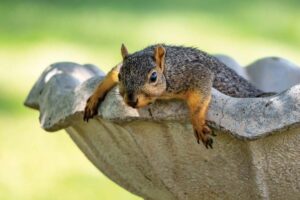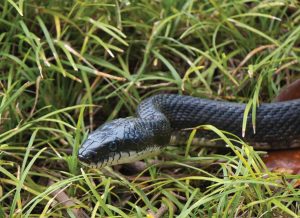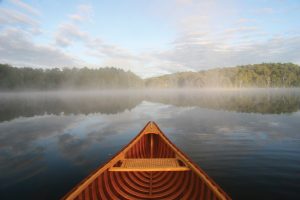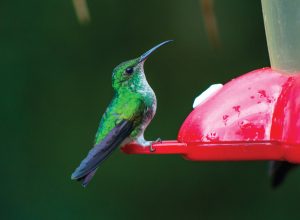I grew up in Alton, just uphill from where Great River Road becomes Broadway Avenue. Back then, during the quiet of night, as I lie in bed, a resonant sound would drift up to me from the Mississippi River. Perhaps it was just the sounding of a horn on a barge’s tugboat at the lock, but to my little girl ears it was melodious and calming. Now I never hear a sound like it without feeling a bit sleepy.
The cooing of a pigeon also takes me back to my childhood hometown. Next to the river at the edge of town, huge concrete silos marked the location of the Peabody Milling Company. Pigeons, probably lured into town by the promise of spilled grain, would perch upon rooftops, nest in cornices and walk about downtown while conversing with each other affably. I would hear their soft, bubbly calls as I’d exit Hayner Library or cross in front of the old Illini Hotel on my way to a matinee.
Hearing the sounds of different birds always plunges my husband into reminiscence. He tells of listening to the repetitive song of a chuck-will’s-widow in the dark before daybreak as he was positioning himself for a hunt in Shawnee National Forest. “As the sun rose, the chuck-will’s-widow quieted. Then the wild turkeys began to gobble, the sound resonating off the hills,” he recalls.
Sounds can stir a memory like nothing else and are also poignant symbols. Consider the sound of a siren, a car horn or a whistle.
An incident at a nature center made me realize the significance embodied in the simple sounds of our daily lives. I was working on a wildflower bed and had just noticed that my stomach was feeling a bit empty when the other volunteer said, “Well, there’s the whistle.” Hearing only the buzzing of a bee, I looked over at him. My confusion must have shown, because he smiled and explained, “Lunchtime!” He was joking about being compelled to eat by a whistle, just as he had when he had worked at a factory. I responded, “Yes, the bell did just ring.” Why? Because I’m a retired teacher.
Sounds of nature can likewise be symbolic. Who does not associate the whine of locusts or cicadas with the dog days of summer? When I was a child, the loud racket of cicadas could be proclaiming a heat index of 90, but we would still be out playing on a wooded hillside in our urban neighborhood. We were free. It was our summer break from school, and we wanted every moment to count. To me, the sound of cicadas is the announcement of the passage of time – summer is here, but beware, the end of summer vacation is near. Even now, when the first cicada sings in the barnyard trees, I think it won’t be long before the school busses are running again.
Truly, the sounds of nature elicit emotion. Nothing is more cheering than a robin’s dawn song, more attention-getting than a mosquito’s whine or more eerie than the howling of coyotes.
I have laughed out loud at the brumph of a bullfrog and shed a tear at the scream of a baby rabbit caught by a mink. I’ve cheered the pent of a woodcock as its buzzy call emanated from the bottoms where the trees my family planted grow. And what a thrill to have heard the booming of greater prairie-chickens in Jasper County, an Illinois endangered species.
I once stood awestruck watching seven whooping cranes fly southward silently. I felt joy and gloom at the same time. I had missed hearing the rare birds’ whoop, but I was thinking that sadly, for future generations their song may only be available as a digital recording.
Step into the great outdoors, maybe climb to the top of a hill, and listen! You may be surprised by what you hear, and the memories evoked.
Patty Gillespie is involved in education, agriculture, land stewardship and the study of nature. She writes from the heart and for the sheer joy of it.









